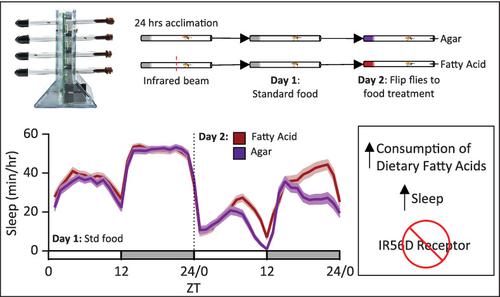当前位置:
X-MOL 学术
›
Genes Brain Behav.
›
论文详情
Our official English website, www.x-mol.net, welcomes your
feedback! (Note: you will need to create a separate account there.)
Dietary fatty acids promote sleep through a taste-independent mechanism.
Genes, Brain and Behavior ( IF 2.4 ) Pub Date : 2020-01-09 , DOI: 10.1111/gbb.12629 Estelle L S Pamboro 1 , Elizabeth B Brown 1 , Alex C Keene 1
Genes, Brain and Behavior ( IF 2.4 ) Pub Date : 2020-01-09 , DOI: 10.1111/gbb.12629 Estelle L S Pamboro 1 , Elizabeth B Brown 1 , Alex C Keene 1
Affiliation

|
Consumption of foods that are high in fat contribute to obesity and metabolism‐related disorders. Dietary lipids are comprised of triglycerides and fatty acids, and the highly palatable taste of dietary fatty acids promotes food consumption, activates reward centers in mammals and underlies hedonic feeding. Despite the central role of dietary fats in the regulation of food intake and the etiology of metabolic diseases, little is known about how fat consumption regulates sleep. The fruit fly, Drosophila melanogaster, provides a powerful model system for the study of sleep and metabolic traits, and flies potently regulate sleep in accordance with food availability. To investigate the effects of dietary fats on sleep regulation, we have supplemented fatty acids into the diet of Drosophila and measured their effects on sleep and activity. We found that flies fed a diet of hexanoic acid, a medium‐chain fatty acid that is a by‐product of yeast fermentation, slept more than flies starved on an agar diet. To assess whether dietary fatty acids regulate sleep through the taste system, we assessed sleep in flies with a mutation in the hexanoic acid receptor Ionotropic receptor 56D, which is required for fatty acid taste perception. We found that these flies also sleep more than agar‐fed flies when fed a hexanoic acid diet, suggesting the sleep promoting effect of hexanoic acid is not dependent on sensory perception. Taken together, these findings provide a platform to investigate the molecular and neural basis for fatty acid‐dependent modulation of sleep.
中文翻译:

膳食脂肪酸通过与口味无关的机制促进睡眠。
食用高脂食物会导致肥胖和与代谢有关的疾病。膳食脂质由甘油三酸酯和脂肪酸组成,并且膳食脂肪酸的高口感促进了食物的消耗,激活了哺乳动物的奖励中心并成为享乐主义的基础。尽管膳食脂肪在调节食物摄入量和代谢疾病的病因中起着核心作用,但人们对脂肪消耗如何调节睡眠知之甚少。果蝇果蝇(Drosophila melanogaster)为研究睡眠和代谢特征提供了强大的模型系统,果蝇根据食物供应量有效调节睡眠。为了研究饮食脂肪对睡眠调节的影响,我们在果蝇饮食中添加了脂肪酸并测量它们对睡眠和活动的影响。我们发现,果蝇饲喂己酸饮食(一种中链脂肪酸,它是酵母发酵的副产品),其饮食所消耗的果蝇比琼脂饮食饥饿的果蝇多。为了评估饮食中的脂肪酸是否通过味觉系统调节睡眠,我们评估了果蝇睡眠中己酸受体Ionotropic受体56D的突变,这是脂肪酸味觉感知所必需的。我们发现,饲喂己酸饮食后,这些果蝇的睡眠也比琼脂喂养的果蝇更多,这表明己酸的睡眠促进作用并不依赖于感官知觉。综上所述,这些发现为研究脂肪酸依赖性睡眠调节的分子和神经基础提供了一个平台。
更新日期:2020-01-09
中文翻译:

膳食脂肪酸通过与口味无关的机制促进睡眠。
食用高脂食物会导致肥胖和与代谢有关的疾病。膳食脂质由甘油三酸酯和脂肪酸组成,并且膳食脂肪酸的高口感促进了食物的消耗,激活了哺乳动物的奖励中心并成为享乐主义的基础。尽管膳食脂肪在调节食物摄入量和代谢疾病的病因中起着核心作用,但人们对脂肪消耗如何调节睡眠知之甚少。果蝇果蝇(Drosophila melanogaster)为研究睡眠和代谢特征提供了强大的模型系统,果蝇根据食物供应量有效调节睡眠。为了研究饮食脂肪对睡眠调节的影响,我们在果蝇饮食中添加了脂肪酸并测量它们对睡眠和活动的影响。我们发现,果蝇饲喂己酸饮食(一种中链脂肪酸,它是酵母发酵的副产品),其饮食所消耗的果蝇比琼脂饮食饥饿的果蝇多。为了评估饮食中的脂肪酸是否通过味觉系统调节睡眠,我们评估了果蝇睡眠中己酸受体Ionotropic受体56D的突变,这是脂肪酸味觉感知所必需的。我们发现,饲喂己酸饮食后,这些果蝇的睡眠也比琼脂喂养的果蝇更多,这表明己酸的睡眠促进作用并不依赖于感官知觉。综上所述,这些发现为研究脂肪酸依赖性睡眠调节的分子和神经基础提供了一个平台。











































 京公网安备 11010802027423号
京公网安备 11010802027423号